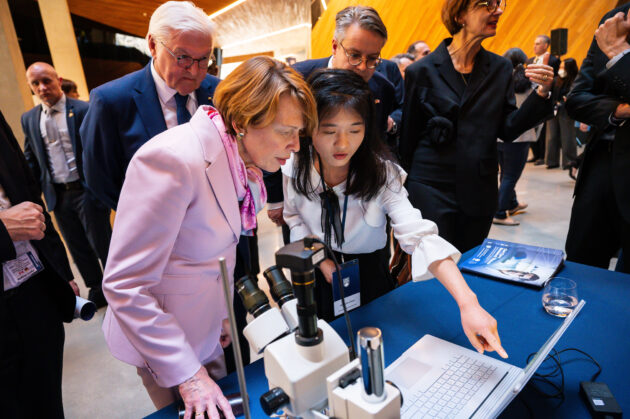
German President visits UBC to highlight the ongoing cleantech manufacturing transition
by CM Staff

President Steinmeier toured UBC Faculty of Applied Science’s soon-to-open hydrogen research platform and met researchers working on clean energy and climate change solutions.

German President visits UBC to highlight the ongoing cleantech manufacturing transition (Credit: UBC)
VANCOUVER — On Apr. 25, the University of British Columbia hosted Frank-Walter Steinmeier, the President of Germany, as part of his first official visit to Canada.
President Steinmeier toured UBC Faculty of Applied Science’s soon-to-open hydrogen research platform and met researchers working on clean energy and climate change solutions, including engineering experts collaborating with German research institutions.
“We were delighted to welcome President Steinmeier to UBC and to showcase our commitment to sustainable energy and advancing research that addresses climate change,” said UBC President and Vice-Chancellor Dr. Deborah Buszard. “President Steinmeier’s visit underscores the importance of international collaboration in the field of clean energy and we look forward to continued partnership with German institutions.”
“What we saw here during our visit to British Columbia is the close cooperation between science institutions at UBC and in Germany and Canada, and this is encouraging for the future,” said President Steinmeier. “Germany and Canada are working together to make the world a better place and that means changing our daily behaviour and developing innovative technology.”
The 70-member German delegation included the Minister of Education and Research, Bettina Stark-Watzinger, First Lady Elke Büdenbender, German Ambassador to Canada Ms. Sabine Sparwasser, and representatives from parliament, business, science and culture.
President Steinmeier’s visit started with a tour of the Smart Hydrogen Energy District (SHED), a unique research platform designed to integrate hydrogen technologies, energy storage and renewable energy generation. The SHED was developed by MéridaLabs, a research group within UBC Applied Science, and is projected to open later this year.
“UBC Applied Science researchers excel at collaborating across large, multidisciplinary projects that lead to relevant, practical solutions to the complex challenges of climate change and clean energy.”
The German President and delegation members also spoke with researchers working on challenges relating to clean energy, digital manufacturing, quantum materials and smart energy storage. Some of the highlighted projects include:
- Dr. Mohammad Arjmand, Canada Research Chair in advanced materials and polymer engineering, leads a team that is embedding enhanced properties into next-generation nanomaterials for applications that include improving defence capabilities.
- A research group led by Dr. David Wilkinson, Canada Research Chair in clean energy and electrochemical technologies, is developing advanced electrochemical methods to produce clean energy and clean water with minimal carbon emissions.
- DLR@UBC, a long-term German-UBC collaboration led by Dr. Anoush Poursartip, involves 30-plus scientists working together on eight projects including improving materials and structures for aeronautics and ground transportation.
- UBC-Fraunhofer Collaboration on Industrial Digital Transformation, led at UBC by Dr. Yusuf Altintas, are looking to transform industry by digitizing machines, processes and infrastructure.
- Researchers at the Max Planck-UBC-UTokyo Centre for Quantum Materials, led at UBC by Dr. Andrea Damascelli, are developing new engineering applications for quantum materials.
- UBC Orbit is a satellite design team led by UBC engineering students and advised by electrical and computer engineering professor Dr. David Michelson, who are building a training satellite that can assist in disaster mitigation and response.